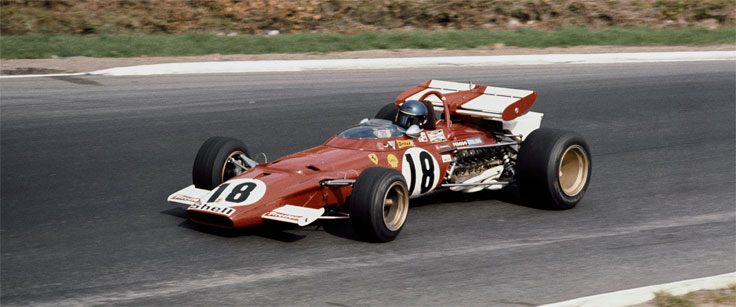
日志

BELGIUM

Jacky Ickx is more famous for his sportscar exploits, including six Le Mans 24 Hours victories and two world titles, than he is for his F1 career. That tends to overshadow the fact that, at his peak, he was one of the top single-seater drivers in the world.
Eight GP wins, including two at the Nurburgring, 13 poles and 13 fastest laps indicate his quality.
Ickx's Ferrari took the fight to Jochen Rindt and the Lotus 72 during the 1970 season, narrowly losing out in a slipstreaming thriller at Hockenheim. After Rindt's death at Monza Ickx became the only man who could overhaul the Austrian's total. He just failed and thus finished runner-up for the second successive year.
After more successes for Ferrari, Ickx's F1 career went in to decline, but there was still time for one more success. Driving for Lotus, Ickx took a fine victory in the 1974 Race of Champions at Brands Hatch before eventually moving full-time to sportscars.

| Born | 1 Jan 1945 |
| Age | 64 |
| Active years | 1967 - 1979 |
| Best | 2nd (1969, 1970) |
| Presences | 120 |
| Starts | 114 |
| Wins | 8 |
| Podiums | 25 |
| Poles | 13 |
| Front row | 25 |
| Fastest laps | 13 |
| Races led | 19 |
39

ITALY
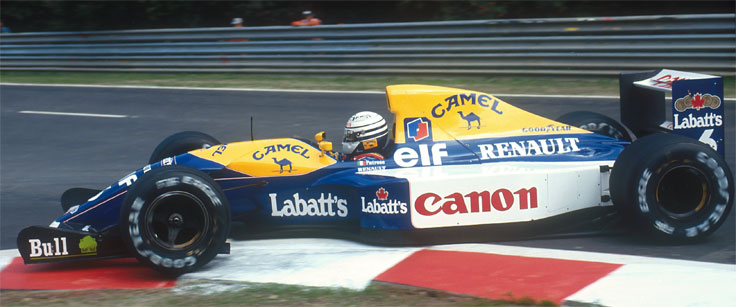
It's hard to believe that the veteran of 256 grand prix starts; the trusted pair of hands; the ideal number two, who retired in 1993, was once regarded as the wildest driver in the field.
Widely blamed for the crash that caused Ronnie Peterson's death at Monza in '78, but later exonerated, the young Italian soon matured into an accomplished performer after leaving Arrows for Brabham, but was outshone all too often by his team-mate Nelson Piquet.
Few will forget the incredible last-lap scenes at Monaco in '82 as he spun his way to a first GP win. But days like that, and his sensational drive at Mexico in 1991 for Williams - where he utterly trounced Nigel Mansell - were few and far between for a man who three times saw his team-mate take the world title.
| Born | 17 Apr 1954 |
| Age | 55 |
| Active years | 1977 - 1993 |
| Best | 2nd (1992) |
| Presences | 257 |
| Starts | 256 |
| Wins | 6 |
| Podiums | 37 |
| Poles | 8 |
| Front row | 28 |
| Fastest laps | 13 |
| Races led | 29 |
38

FRANCE
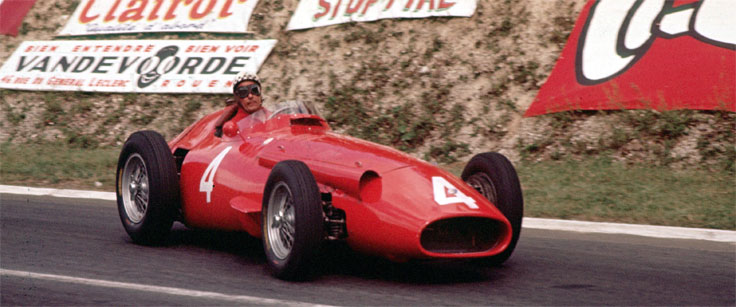
Behra could have been France's first title winner, but despite having the talent never won a world championship grand prix.
A fighter in the Gilles Villeneuve mould, with courage and car control to spare, he became a national hero leading the Gordini team after winning the non-championship Grand Prix de la Marne at Reims in 1952.
His days with Maserati were only slightly less frustrating. In 1955, he had little chance against the all-conquering Mercedes W196s, then played second fiddle to superstar team-mates Stirling Moss and then Juan Manuel Fangio in 1956 and 1957.
Punching Ferrari team manager Romolo Tavoni after retiring on his Ferrari debut in 1959 was a bad career move, and he was promptly sacked. A few weeks later, he was killed after being thrown from his Porsche RSK and hitting a flagpole during a sportscar race at Avus

STATISTICS
| Born | 16 Feb 1921 |
| Died | 1 Aug 1959 |
| Active years | 1952 - 1959 |
| Best | 4th (1956) |
| Presences | 53 |
| Starts | 52 |
| Best race | 2nd |
| Podiums | 9 |
| Best grid | 2nd |
| Front row | 10 |
| Fastest laps | 1 |
| Races led | 7 |
37

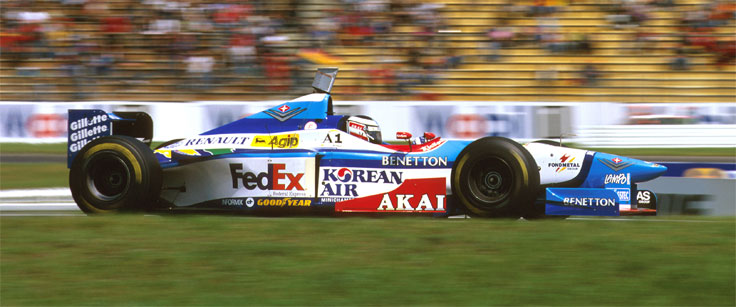
A veteran of 210 grands prix over 14 seasons, Gerhard Berger had the potential to be the fastest driver in F1 on his day. He scored the first and last of his 10 wins for Benetton in two spells with the team, punctuated by stints at two of F1's greatest teams: Ferrari and McLaren.
Competing with the likes of Mansell, Prost and Senna during that time, he was always likely to be on a hiding to nothing.
His maiden win, at the 1986 Mexican GP, owed as much to clever strategy as it did to his speed, but Berger's 10th and final triumph, in the 1997 German GP at Hockenheim, may go down as his greatest F1 performance. Facing the sack, suffering the after effects of a sinus operation, and dealing with the recent death of his father, Berger took pole, cut fastest lap and dominated the race.
The warm reaction of the paddock said everything about how highly this good-humoured Austrian was regarded within the circles of the sport.
| Born | 27 Aug 1959 |
| Age | 50 |
| Active years | 1984 - 1997 |
| Best | 3rd (1988, 1994) |
| Starts | 210 |
| Wins | 10 |
| Podiums | 48 |
| Poles | 12 |
| Front row | 32 |
| Fastest laps | 21 |
| Races led | 32 |
36

SWITZERLAND
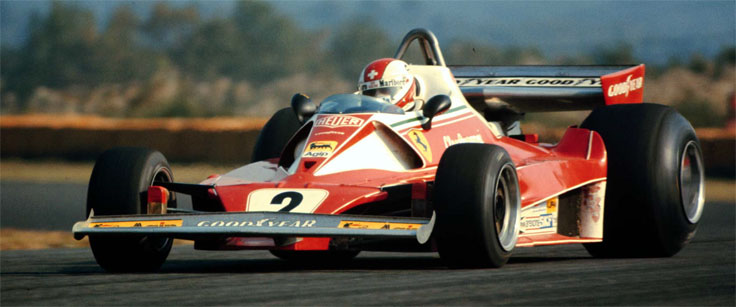
Two stints at Ferrari and scoring Williams's maiden grand prix victory are the clear highlights of Clay Regazzoni's 10-year Formula 1 career.
The relationship with the Prancing Horse got off to a dream start when the Swiss driver took fourth on his debut in Holland, while there's nowhere better to take your maiden win in one of the red cars than Monza, which Regazzoni managed later that same season.
He left Ferrari for 1973, but was back a year later, playing the role of number two to Niki Lauda. Despite taking a win each season from '74-'76, he was moved on for 1977.
After two years out of competitive machinery he was playing the number two role again, this time to Alan Jones at Williams in 1979. But it was Regazzoni who gave Frank Williams's team its first win, inheriting the lead at Silverstone when Jones retired.
| Born | 5 Sep 1939 |
| Died | 15 Dec 2006 |
| Active years | 1970 - 1980 |
| Best | 2nd (1974) |
| Presences | 139 |
| Starts | 132 |
| Wins | 5 |
| Podiums | 28 |
| Poles | 5 |
| Front row | 21 |
| Fastest laps | 15 |
| Races led | 20 |
35

GERMANY
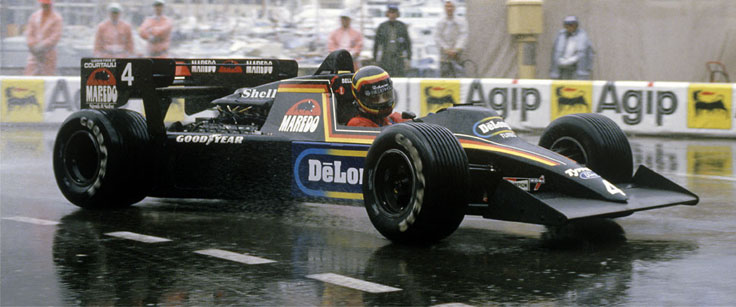
This shy German had started just 20 grands prix when he died in the summer of 1985, aged 28, and his best result in F1 was a mere fourth place at Monaco. But the fact that more than 25 years on his peers consider him the 35th greatest talent further establishes the legend of a shocking level of unfulfilled potential.
Bellof's dumbfounding speed was attributed by many of his rivals to a complete absence of fear, but there are those who believe he played on this reputation and was more calculating than the reckless spirit he projected.
Either way, the results Bellof achieved in Formula 2 and sportscars were spectacular both in form and the manner he produced them. That he died fighting for the lead of a world championship sportscar race at Spa in circumstances that could only be blamed on him, just as his career seemed destined to bloom, is a tragic yet appropriate epitaph for the ultimate 'what-might-have-been' driver.
| Born | 20 Nov 1957 |
| Died | 1 Sep 1985 |
| Active years | 1984 - 1985 |
| Best | 16th (1985) |
| Presences | 22 |
| Starts | 20 |
| Best race | 4th |
| Best grid | 4th |
34

ARGENTINA
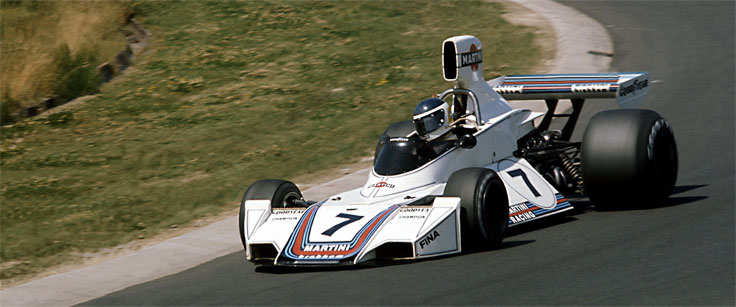
Given that Carlos Reutemann went on to serve as governor of the Argentine state of Santa Fe, it should come as little surprise that his Formula 1 career was defined by politics.
Today, his name is immediately associated with a bitter fight with Williams team-mate Alan Jones during the 1981 season - a fallout that began when Reutemann ignored team orders in Brazil, and ended with Jones refusing to lend Reutemann his support in the title-deciding final race at Las Vegas, where Reutemann fell to Nelson Piquet by a single point. Bad blood between he and the team prompted him to quit F1 just two rounds into the following season.
But all of the controversy sells his talent short. Exceptionally smooth behind the wheel, Reutemann joins Giuseppe Farina, Mario Andretti and Jacques Villeneuve as one of just four drivers to take pole on debut courtesy of his effort in the year-old Brabham BT34 at Argentina in 1972. Consistency wasn't Reutemann's strong point, but on his day he was sublime. Plenty of drivers have done worse than win races with Brabham, Ferrari and Williams ...
| Born | 12 Apr 1942 |
| Age | 67 |
| Active years | 1972 - 1982 |
| Best | 2nd (1981) |
| Starts | 146 |
| Wins | 12 |
| Podiums | 45 |
| Poles | 6 |
| Front row | 22 |
| Fastest laps | 6 |
| Races led | 19 |
33

UNITED STATES
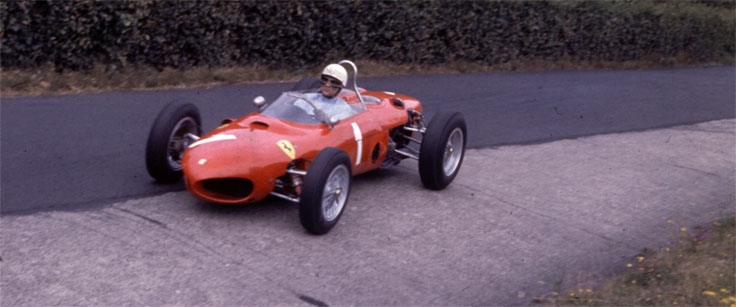
America's first world champion, Phil Hill would probably have achieved more had he not switched to the ill-fated ATS operation at the end of 1962.
Hill, who also carved out a successful sportscar career, demonstrated himself to be a good team player when he moved aside at the 1958 Moroccan GP to enable Ferrari team-mate Mike Hawthorn to take the title. He was rewarded with a full-time drive and took his first GP win at Monza in 1960 after the British teams boycotted the banked circuit.
It's often said that only the death of Wolfgang von Trips allowed Hill to take his title in 1961, but he had been evenly matched with his team-mate and was still a threat when the German made his fatal mistake at Monza.
There were no more F1 wins, but Hill would go on winning sportscar races until 1967.

| Born | 20 Apr 1927 |
| Died | 28 Aug 2008 |
| Active years | 1958 - 1966 |
| Champion | 1961 |
| Presences | 51 |
| Starts | 48 |
| Wins | 3 |
| Podiums | 16 |
| Poles | 6 |
| Front row | 9 |
| Fastest laps | 6 |
| Races led | 9 |
32

ITALY
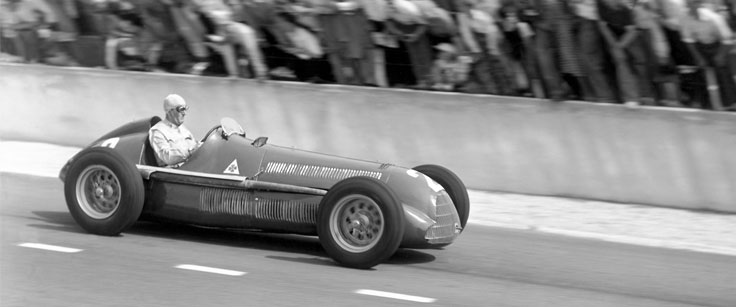
The Italian pre-war ace was arguably past his best when he won the inaugural world championship in 1950 when a month short of his 44th birthday, although a little age gave the driver who was once grand prix racing's wild man the maturity to win a title.
Alfa Romeo's lead driver in 1950, he fought hard to beat team-mate Juan Manuel Fangio to the 1950 title after winning three of the six world championship grands prix. But the writing was on the wall, and in 1951 he could do nothing about Fangio's speed.
It was a similar story at Ferrari in 1952-1953, when he played second fiddle to Alberto Ascari, although there was a final victory at the age of 47 in the 1953 German Grand Prix before he started to wind down in 1954.
If ever there was a case of the Second World War robbing a driver of his best years, it was Farina.

| Born | 30 Oct 1906 |
| Died | 30 Jun 1966 |
| Active years | 1950 - 1955 |
| Champion | 1950 |
| Presences | 34 |
| Starts | 33 |
| Wins | 5 |
| Podiums | 20 |
| Poles | 5 |
| Front row | 27 |
| Fastest laps | 5 |
| Races led | 14 |
31

AUSTRALIA
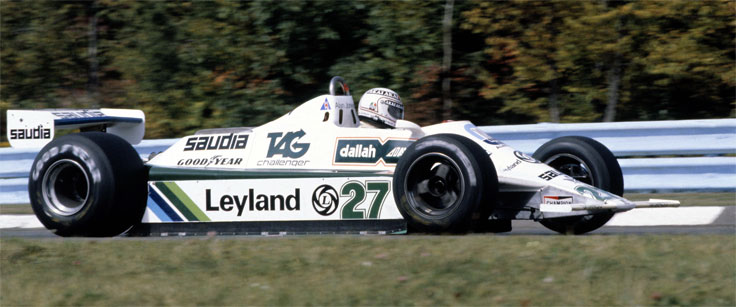
It might seem paradoxical that a character so stereotypically Australian as Alan Jones remains the driver by which a team so stereotypically British as Williams has come to measure all others.
But in their shared no-nonsense, tough love approach, they couldn't have been more compatible. The fact that Jones was the driver who turned Williams from middling privateers into world champions didn't hurt, either. Four wins in 1979 with the FW07 gave the team a kick-start, and set the scene for the five victories in 1980 that put Jones 13 points clear of Nelson Piquet to give him the title.
A fierce intra-team rivalry with Carlos Reutemann helped deny him back-to-back championships and he retired at the end of the year, notwithstanding a couple of fruitless comebacks with Arrows and Team Haas.

| Born | 2 Nov 1946 |
| Age | 63 |
| Active years | 1975 - 1986 |
| Champion | 1980 |
| Presences | 117 |
| Starts | 116 |
| Wins | 12 |
| Podiums | 24 |
| Poles | 6 |
| Front row | 13 |
| Fastest laps | 13 |
| Races led | 24 |
30

GREAT BRITAIN
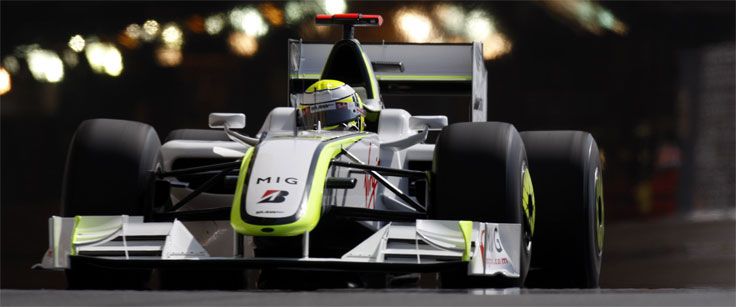
Even before he won the 2009 world championship, Jenson Button's economical driving style - ultra-smooth, with minimal input and no wasted movement - had become something of a trademark.
But it's interesting to consider how history might have viewed the Briton had Brawn not performed the mother of all phoenix tricks and turned the ashes of Honda into an instant race-winner.
The promise was apparent early - an audition for a test role with Williams turned into a shoot-out with Bruno Junqueira for a race seat in 2000. He performed well as a rookie, but a mixture of circumstance and managerial intervention sent the Briton bouncing fruitlessly between Benetton, Renault and BAR until the latter's buyout by Honda. A win came at the Hungaroring in 2006, but as the team went into decline, points became ever more scarce. If nothing else, Button's career stands as a monument to the fine line between glory and obscurity.

| Born | 19 Jan 1980 |
| Age | 29 |
| Active years | 2000 - 2009 |
| Champion | 2009 |
| Presences | 172 |
| Starts | 170 |
| Wins | 7 |
| Podiums | 24 |
| Poles | 7 |
| Front row | 15 |
| Fastest laps | 2 |
| Races led | 20 |
29

FRANCE
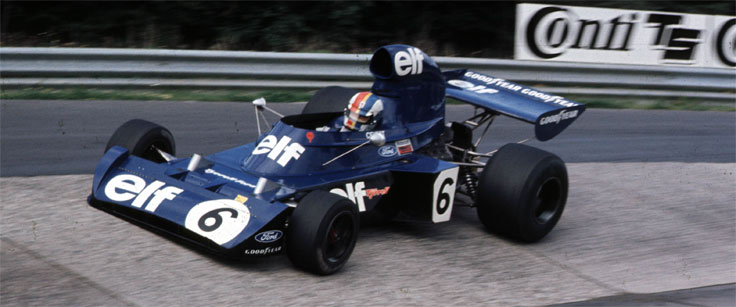
One of motor-racing's great what might have been stories. The Frenchman was Jackie Stewart's team-mate and protege at Tyrrell, and was ready to take over the mantle of team leader as the 1973 season came to an end.
But the world will never know what Cevert would have achieved in 1974 after he was killed in a violent pratice accident at Watkins Glen.
Cevert, who was Stewart's choice as team-mate, never saw the end of a year in which he had finally come of age. In 1972, results had been few and far between, with only a couple of second places, but in 1973 he was second six times as he supported the Scot well.
He already had a first win under his belt, in the 1971 US Grand Prix, and he would surely have added to that tally had he lived.

| Born | 25 Feb 1944 |
| Died | 6 Oct 1973 |
| Active years | 1970 - 1973 |
| Best | 3rd (1971) |
| Presences | 47 |
| Starts | 46 |
| Wins | 1 |
| Podiums | 13 |
| Best grid | 1st |
| Front row | 3 |
| Fastest laps | 2 |
| Races led | 5 |
28

UNITED STATES
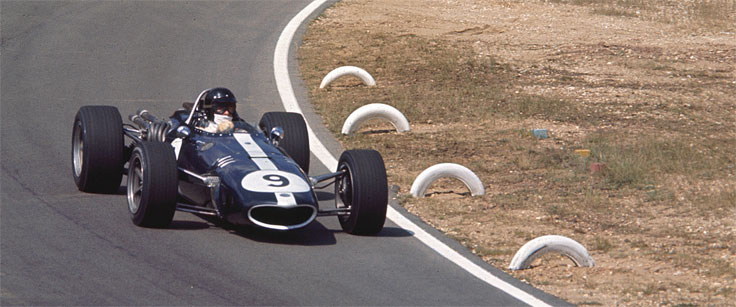
The best American road racer of his generation and, of course, the only competitor that Jim Clark truly feared, Gurney was most at home in the 1.5-litre era of the early 1960s where his sympathy with the highly-fragile machinery counted for much.
Despite winning races for Porsche and Brabham, his greatest triumph was victory in the 1967 Belgian Grand Prix in his own car, the Anglo-American Racers-run Eagle-Weslake, making him the only man to take maiden world championship race wins for three different constructors.
Even more significantly, he was the first to fit a small strip of material - now known as the Gurney Flap - onto the wing of a racing car in order to increase downforce, and is credited as the man who kicked off the tradition of spraying - rather than drinking - champagne on the podium.

| Born | 13 Apr 1931 |
| Age | 78 |
| Active years | 1959 - 1970 |
| Best | 4th (1961, 1965) |
| Presences | 87 |
| Starts | 86 |
| Wins | 4 |
| Podiums | 19 |
| Poles | 3 |
| Front row | 22 |
| Fastest laps | 6 |
| Races led | 16 |
27

ARGENTINA
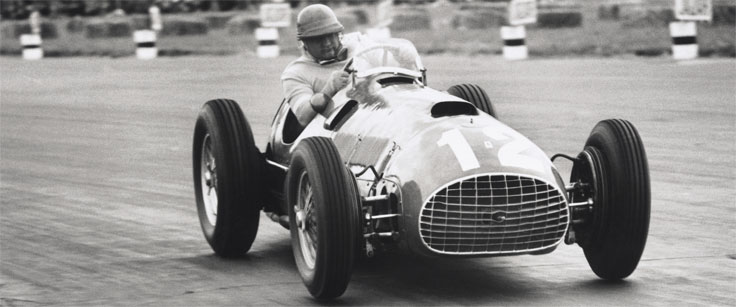
The other great Argentinian grand prix driver of the 1950s was nicknamed El Cabezon (Fat Head) and The Pampus Bull tells you a lot about Jose Froilan Gonzalez's physique. That he was able to stun Ferrari team leader Alberto Ascari with his speed as he dominated the 1951 British Grand Prix tells you everything you need to know about his ability.
Overshadowed by Juan Manuel Fangio, Gonzalez never contested a full world championship season despite being a Ferrari and Maserati factory driver - easing off his racing activities following the death of compatriot Onofre Marimon at the Nurburgring in 1954 two weeks after winning his second British Grand Prix.
He continued to make sporadic appearances until 1960 and he would surely have won more grands prix had he accepted Tony Vandervell's overtures to become a full-time Vanwall driver after his one-off apperance at Silverstone in 1956.

| Born | 5 Oct 1922 |
| Age | 87 |
| Active years | 1950 - 1960 |
| Best | 2nd (1954) |
| Presences | 27 |
| Starts | 26 |
| Wins | 2 |
| Podiums | 15 |
| Poles | 3 |
| Front row | 12 |
| Fastest laps | 6 |
| Races led | 9 |
26

GERMANY
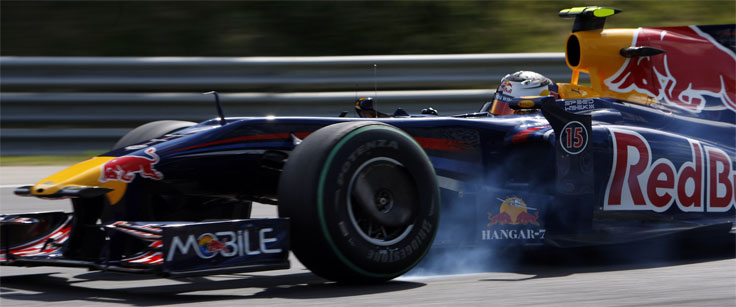
F1's youngest points scorer, F1 youngest race winner and a championship contender in his second full season. Success has come quickly to Sebastian Vettel, whose youthful, enthusiastic personality belies a steely, focused will to win.
His maiden victory in torrential conditions in Monza behind the wheel of a Toro Rosso marked him out as F1's latest rainmeister and made the whole paddock sit up and take notice.
But there were still some who doubted his outright credentials as a megastar. These were dispelled in emphatic fashion at Red Bull this year. He trounced team-mate Mark Webber 15:2 in qualifying and his wins at Silverstone and Suzuka were the work of a world-class talent.
Given his nationality comparisons with Michael Schumacher are inevitable. The fact these are proving to be justified is as high as praise comes.

| Born | 3 Jul 1987 |
| Age | 22 |
| Active years | 2006 - 2009 |
| Best | 2nd (2009) |
| Presences | 50 |
| Starts | 43 |
| Wins | 5 |
| Podiums | 9 |
| Poles | 5 |
| Front row | 9 |
| Fastest laps | 3 |
| Races led | 9 |
25

FINLAND
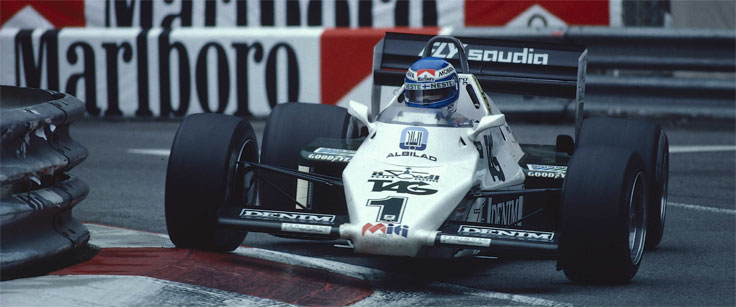
The first Finn to win the world championship was notable in many ways: he only won one race all season, and he was the last title winner to use the famous Ford DFV engine - before the turbos took over.
Taking over from the retiring Alan Jones at Williams in 1982, Rosberg's sole victory that year came in the Swiss GP at Dijon, his maiden success in F1. He took the title by five points, and was the only man to outscore Ferrari's Didier Pironi who didn't take part in the final four races of the season due to career-ending leg injuries.
Rosberg came closest to repeating his success in 1985, when he placed third. This included him setting a 160mph qualifying lap of Silverstone, which stood as the fastest-ever lap until 2002. It was also the only year he won more than grand prix in a season.
He retired from his final grand prix, in Australia, while leading for McLaren.

| Born | 6 Dec 1948 |
| Age | 61 |
| Active years | 1978 - 1986 |
| Champion | 1982 |
| Presences | 128 |
| Starts | 114 |
| Wins | 5 |
| Podiums | 17 |
| Poles | 5 |
| Front row | 10 |
| Fastest laps | 3 |
| Races led | 20 |
24

GREAT BRITAIN
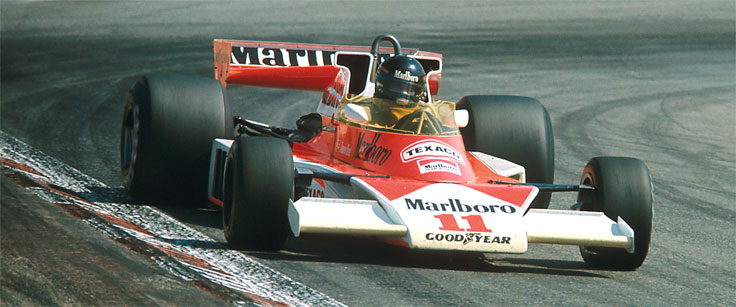
James Hunt captured the imagination of a generation of British teenagers in the summer of 1976, as he swash-buckled and partied his way to the Formula 1 world championship title. But despite the fun-loving playboy side to his nature, he saved a fierce and competitive racing force for his rivals on the track.
Known as Hunt-the-shunt in his reckless F3 days, when the mood took him, there was no one faster, as he proved at Hesketh from '73-'75. It needed McLaren to hone the champion potential though, and he continued to race on nerves that frequently made him vomit prior to the start of a race. He grew into a match for all of his rivals, save perhaps Niki Lauda.
That the '76 title provided the pinnacle of his career was fitting given the nature in which he fought against the odds in the pouring rain of Fuji, to third, overhauling Lauda's points total - the Austrian having dramatically pulled out because of the conditions.

| Born | 29 Aug 1947 |
| Died | 15 Jun 1993 |
| Active years | 1973 - 1979 |
| Champion | 1976 |
| Presences | 93 |
| Starts | 92 |
| Wins | 10 |
| Podiums | 23 |
| Poles | 14 |
| Front row | 24 |
| Fastest laps | 8 |
| Races led | 24 |
23

GREAT BRITAIN
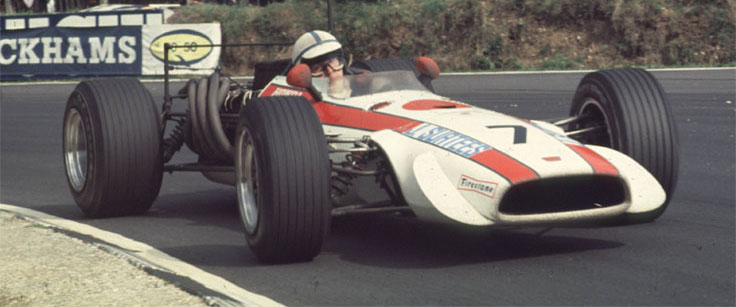
Already a multiple world champion on two wheels by the time he made his Formula 1 debut in 1960 in a Lotus, Surtees made an immediate impact. A podium finish in his second race and pole at his third, his services were soon courted by Ferrari.
His world title in 1964 was a just reward for his efforts, but major injuries sustained in a Can-Am crash a year later threatened to end his career.
His determination to do things his own way probably hastened his amazing recovery, but it also caused rows over technical and management issues at Ferrari and proved instrumental in his decision to quit the team midway through '66.
Further wins came with Cooper and Honda, but not in three years with his own team as 'his way' did not prove to be the way.

| Born | 11 Feb 1934 |
| Age | 75 |
| Active years | 1960 - 1972 |
| Champion | 1964 |
| Presences | 113 |
| Starts | 111 |
| Wins | 6 |
| Podiums | 24 |
| Poles | 8 |
| Front row | 21 |
| Fastest laps | 10 |
| Races led | 17 |
22

FINLAND
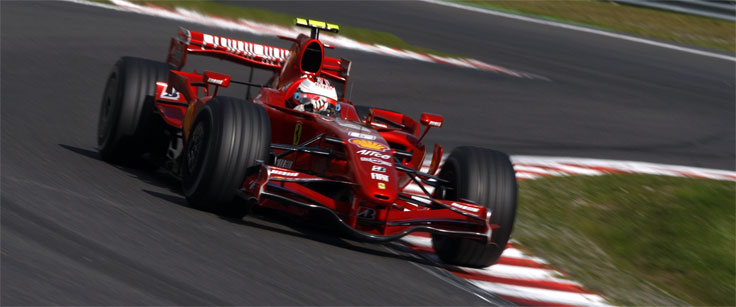
One of the sport's great mavericks of recent times, with a reputation for drinking and partying as hard as he raced. Scored a point in his first grand prix for Sauber before making his reputation with a five-year stint with McLaren which yielded total of nine wins.
He won seven grands prix in 2005 alone, but couldn't overcome a disastrous start to the season, due to poor reliability, that gave Renault's Fernando Alonso a massive headstart. The highlight of that season was charging to victory at Suzuka from 17th on the grid, passing Giancarlo Fisichella at the first corner of the last lap.
A big money switch to Ferrari in 2007 led to world championship success following an amazing comeback from 17 points behind thanks to victories in the last two grands prix of the season.
Turned his back on F1 for rallying for 2010 after being dropped by Ferrari for Alonso.

| Born | 17 Oct 1979 |
| Age | 30 |
| Active years | 2001 - 2009 |
| Champion | 2007 |
| Presences | 157 |
| Starts | 155 |
| Wins | 18 |
| Podiums | 62 |
| Poles | 16 |
| Front row | 32 |
| Fastest laps | 35 |
| Races led | 55 |
21

GREAT BRITAIN
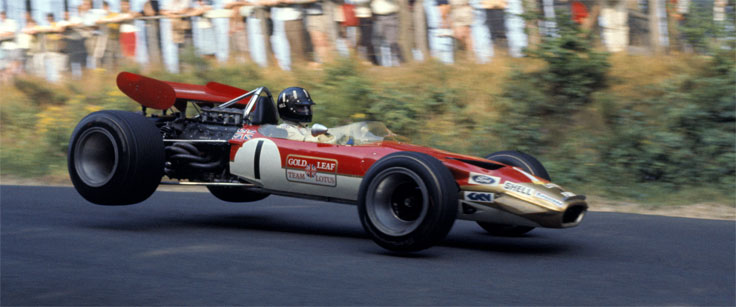
A thoroughly British racing driver, who started all 176 of his world championship races in British-built machinery with BRM, Lotus, Shadow, Lola and his own nascent Embassy Hill constructor.
A 14-time grand prix winner, Hill's two titles came in very different circumstances. He won the 1962 world championship for BRM, completing the team's odyssey from laughing stock to top of the world, while in 1968 he helped regroup Team Lotus behind him after the death of Jim Clark.
He had a laconic style behind the wheel, and is often damned with the faint praise of being a "hard worker" to Clark's "natural talent". He was a hard worker, but he cut it with the best in the 1960s and had far more ability than many credit him with.
He loved driving, plugging on in F1 until 1975 until his embarrassing failure to qualify for the Monaco Grand Prix - a race he was king of in the 1960s - before dying in a plane crash later that year.

| Born | 15 Feb 1929 |
| Died | 29 Nov 1975 |
| Active years | 1958 - 1975 |
| Champion | 1962, 1968 |
| Presences | 179 |
| Starts | 176 |
| Wins | 14 |
| Podiums | 36 |
| Poles | 13 |
| Front row | 42 |
| Fastest laps | 10 |
| Races led | 32 |
20

UNITED STATES
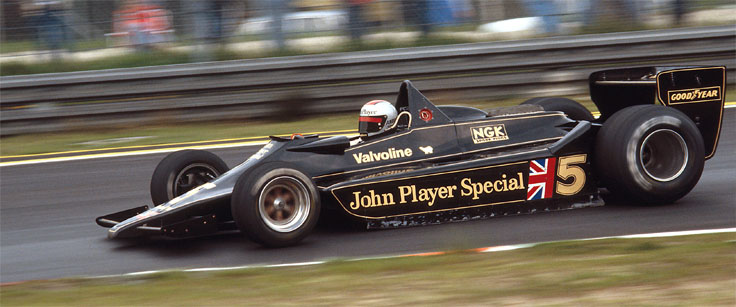
The American dream in driver form, the Italian-born Andretti became arguably the most successful, and certainly the most versatile, racing driver North America has ever produced.
Andretti was already a paid-up star when he made his F1 debut at Watkins Glen in 1968, raising eyebrows by putting his Lotus on pole position. His F1 career was piecemeal in the first half of the 1970s - although he did win the South African Grand Prix for Ferrari in 1971 - before throwing his lot in with the Parnelli team in 1974-1975.
But it was his return to Lotus in 1976 that set him on the path to the title. His development skills helped hone Colin Chapman's brilliant design concepts, and in 1978, Andertti won six times on his way to winning the world championship.
His final F1 return, for Ferrari, yielded a pole position on comeback at Monza in 1982, and he was still winning Indycar races 11 years later at the age of 52!

| Born | 28 Feb 1940 |
| Age | 69 |
| Active years | 1968 - 1982 |
| Champion | 1978 |
| Presences | 131 |
| Starts | 128 |
| Wins | 12 |
| Podiums | 19 |
| Poles | 18 |
| Front row | 24 |
| Fastest laps | 10 |
| Races led | 22 |
19

SWEDEN
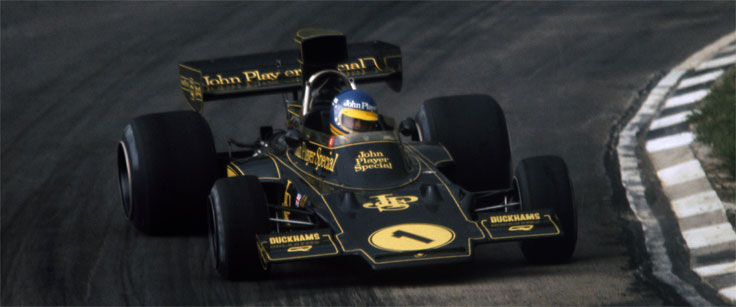
Ronnie Peterson's enduring legacy owes much to his employment of a spectacular sideways style, shunning the smooth approach called for by the evolving aerodynamics of the time.
Regarded by many as one of the fastest drivers in F1 history, 'SuperSwede' was at his scintillating best in qualifying, delighting onlookers by sliding his March, Tyrrell and Lotus steeds as if on a rally stage.
The aggressive approach paid fewer dividends in the races and the world championship thus proved elusive, though a full innings may have righted that wrong.
Peterson's death was as unfortunate as it was tragic. After crashing at the start of the 1978 Italian Grand Prix he was pulled from his burning Lotus 78 by fellow drivers and taken to hospital with badly broken legs. A complication that night led to an embolism that robbed F1 of its hardest charger.

| Born | 14 Feb 1944 |
| Died | 11 Sep 1978 |
| Active years | 1970 - 1978 |
| Best | 2nd (1971, 1978) |
| Starts | 123 |
| Wins | 10 |
| Podiums | 26 |
| Poles | 14 |
| Front row | 25 |
| Fastest laps | 9 |
| Races led | 28 |
18

AUSTRALIA
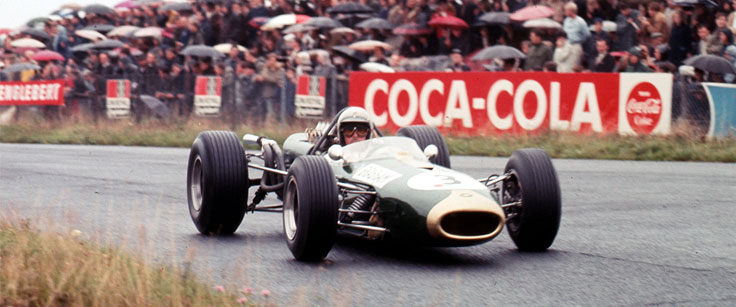
Laconic to the point of taciturn - he was called 'Black Jack' for a reason - Jack Brabham occupies a unique place in F1 history. Having honed his skills racing midgets and hillclimbs in Australia, he moved to England and linked up with Cooper.
The partnership yielded back-to-back championships in 1959 and 1960, and a third followed in 1966 for the eponymous team that he'd set up with compatriot and designer Ron Tauranac a few years earlier.
While renowned for his technical skill, Brabham deserved respect as a driver. His aggressive style might not have had the finesse of his rivals, but then again none of them were winning their third world title at the age of 40 - as unlikely a proposition then as it is today.

| Born | 2 Apr 1926 |
| Age | 83 |
| Active years | 1955 - 1970 |
| Champion | 1959, 1960, 1966 |
| Presences | 128 |
| Starts | 126 |
| Wins | 14 |
| Podiums | 31 |
| Poles | 13 |
| Front row | 38 |
| Fastest laps | 12 |
| Races led | 28 |
17

GREAT BRITAIN
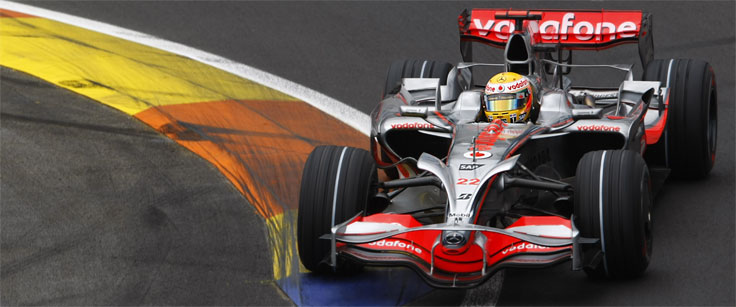
From the moment McLaren gave its backing to an ambitious 10-year-old karter there were great expectations of Lewis Hamilton. And he delivered in style. The Formula Renault UK title, the F3 Euro Series crown and the GP2 championship presaged a move into F1 with McLaren.
Teamed up with double world champion Fernando Alonso, many critics doubted the wisdom of promoting Hamilton so quickly. But he confounded them instantly, finishing on the podium in his first grand prix.
A maiden win followed in Canada, backed up with a second win a week later in the US. Lewis was heading towards an unprecedented championship win in his first season when disaster struck in the last two races.
His failure was quickly forgotten with victory in the opening race of 2008. Four more wins and the world championship followed. The 2009 McLaren started the year off the pace, but Hamilton showed his skill and maturity in helping turn the team around and scored a brace of brilliant late-season wins.

| Born | 7 Jan 1985 |
| Age | 24 |
| Active years | 2007 - 2009 |
| Champion | 2008 |
| Starts | 52 |
| Wins | 11 |
| Podiums | 27 |
| Poles | 17 |
| Front row | 25 |
| Fastest laps | 3 |
| Races led | 28 |
16

ITALY
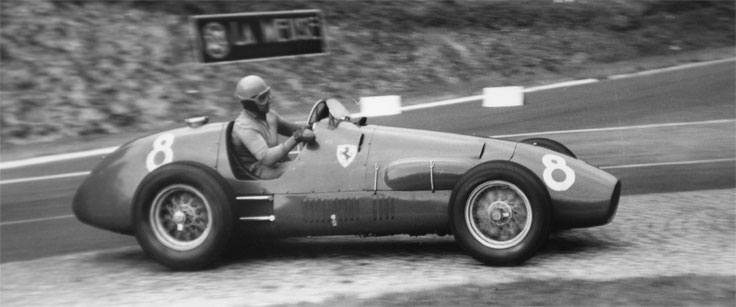
Enzo Ferrari described Alberto Ascari as being 'virtually impossible to overtake' when leading. It is a notion to which the 1952 season attests, since Ascari was victorious in six of the year's eight races, before going on to win the first three grands prix of 1953 (not counting the Indianapolis 500).
With these feats Ascari established records for the highest percentage of wins in a season and for the most consecutive wins from races started, both of which remain unbroken almost six decades later.
Ascari lost his life while testing a Ferrari sportscar at Monza in May 1955. His death held eerie similarities to that of his father, Antonio, himself a grand prix driver; each met his end on the 26th day of the month, seven weeks shy of his 37th birthday and with 13 grand prix triumphs to his name.

| Born | 13 Jul 1918 |
| Died | 26 May 1955 |
| Active years | 1950 - 1955 |
| Champion | 1952, 1953 |
| Starts | 32 |
| Wins | 13 |
| Podiums | 17 |
| Poles | 14 |
| Front row | 25 |
| Fastest laps | 12 |
| Races led | 21 |
15

FINLAND
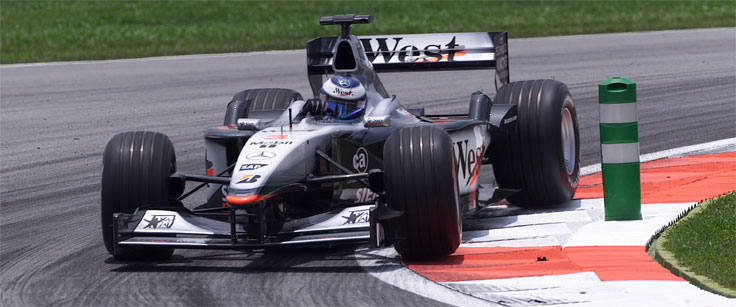
One of the few to beat Michael Schumacher in a straight fight, Hakkinen was twice crowned world champion at the end of the '90s for McLaren.
But if it wasn't for the skills of trackside medics, who performed an emergency tracheotomy after a crash in practice at Adelaide in 1995, it would have been a very different story. Hakkinen's comeback meant his relationship with Ron Dennis transcended the norm of driver/team boss - much as with Ayrton Senna at the start of that decade.
His '98 title came after a nerve-jangling head-to-head with Schumacher at Suzuka, while the second, in '99, should have been easier after Schu broke his leg at Silverstone, but was punctuated by errors - most famously at Monza. Again, a masterful performance in Japan sealed the deal.
His greatest win came at Spa in 2000, when he defeated Schumacher with a dazzling pass a lap after the German had edged him onto the grass at 200mph.

| Born | 28 Sep 1968 |
| Age | 41 |
| Active years | 1991 - 2001 |
| Champion | 1998, 1999 |
| Presences | 165 |
| Starts | 161 |
| Wins | 20 |
| Podiums | 51 |
| Poles | 26 |
| Front row | 39 |
| Fastest laps | 25 |
| Races led | 48 |
14

AUSTRIA
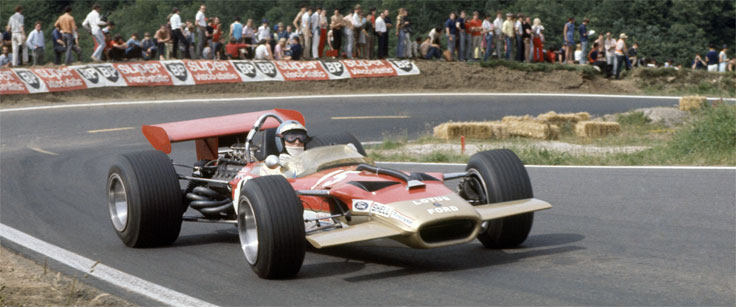
Speak to anyone who raced against Jochen Rindt, be it in F1 or in F2, and they are without fail in awe of the Austrian's ability. It took him a while to get behind the wheel of a racewinning car in F1 after spending three years with Cooper from 1965-1967 and then a season with unreliable Brabham in 1968, but when he did he made the most of it.
His move to Lotus, where he linked up with the great innovator Colin Chapman, gave him that chance. His way of thinking dovetailed well with that of Chapman despite occasional disagreements, and in 1970 Rindt and the Lotus 72 were formidable.
He won five out of six mid-season races (his Monaco win coming behind the wheel of the Lotus 49C) and won the title in tragic circumstances after being killed in practice at Monza.

| Born | 18 Apr 1942 |
| Died | 5 Sep 1970 |
| Active years | 1964 - 1970 |
| Champion | 1970 |
| Presences | 62 |
| Starts | 60 |
| Wins | 6 |
| Podiums | 13 |
| Poles | 10 |
| Front row | 18 |
| Fastest laps | 3 |
| Races led | 12 |
13

BRAZIL
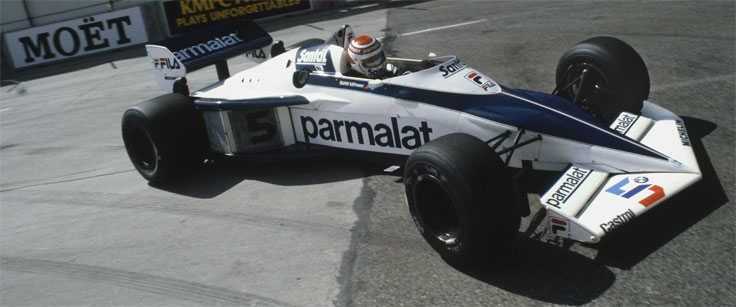
Piquet burst onto the scene in 1979, effectively forcing Niki Lauda into retirement with some stunning qualifying performances. It convinced Bernie Ecclestone to entrust Piquet with team leadership at Brabham.
With Gordon Murray designing the cars it was a highly successful relationship, yielding two world titles. Piquet's brilliance as a test driver turned the unreliable BMW turbo into a title-winner.
A move to Williams made Piquet a very rich man, but his failure to exert his authority over team-mate Nigel Mansell also took the shine off his reputation. His huge Imola crash knocked the edge off his performance too, but his testing prowess in developing the active suspension brought a third title.
His Lotus years were a disaster, but two seasons at Benetton produced three more wins. After leaving F1 he entered the Indy 500 and badly broke both legs in a massive crash, which effectively ended his competitive career.

| Born | 17 Aug 1952 |
| Age | 57 |
| Active years | 1978 - 1991 |
| Champion | 1981, 1983, 1987 |
| Presences | 207 |
| Starts | 204 |
| Wins | 23 |
| Podiums | 60 |
| Poles | 24 |
| Front row | 44 |
| Fastest laps | 23 |
| Races led | 58 |
12

BRAZIL
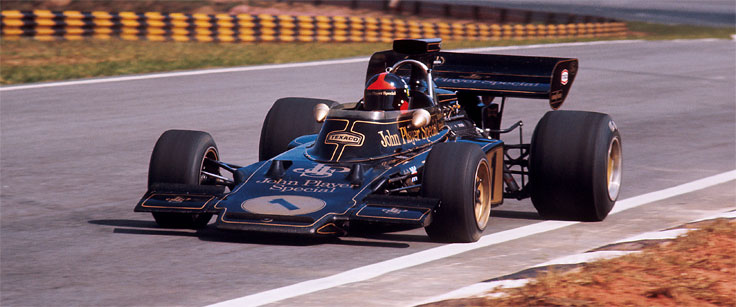
Such was the meteoric talent of Emerson Fittipaldi possessed that having queued for Graham Hill's autograph in the summer of 1969, less than a year later he would become a fellow Lotus driver in F1.
The Brazilian took his meticulous and deeply intense approach to his racing, combined it with a beautifully smooth but fast style, and became the youngest grand prix winner in 1970, and then the youngest world champion in '72. He transported this overwhelming ability to McLaren in 1973 and then gave the team its first world title a year later.
Having failed to succeed with a home-grown Copersucar team he co-ran with his brother, it is testament to the legendary Brazilian's enduring ability that following a 10-year F1 career he then embarked on a separate and longer one in CART. Along with the '89 IndyCar title, came two Indianapolis 500 wins. He was still winning at the age of 49.

| Born | 12 Dec 1946 |
| Age | 62 |
| Active years | 1970 - 1980 |
| Champion | 1972, 1974 |
| Presences | 149 |
| Starts | 144 |
| Wins | 14 |
| Podiums | 35 |
| Poles | 6 |
| Front row | 16 |
| Fastest laps | 6 |
| Races led | 18 |
11

GREAT BRITAIN
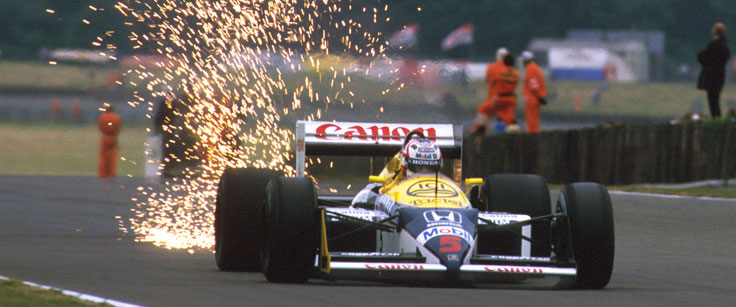
He's the only man to have started more races before winning the world championship than Jenson Button, but it could have been so different for Nigel Mansell. After learning the ropes at Lotus, Mansell's career came alive when he joined Williams in 1985.
A title challenge followed in 1986, where he was cruelly robbed in famous style in Adelaide, while a practice crash at Suzuka a year later cost him another shot at the crown.
It would be four years before Mansell was back in a title-challenging car, but during that time he was able to endear himself to the Ferrari-loving tifosi, who idolised 'Il Leone' almost as much as his adoring British fans.
Equipped with the dominant FW14B, Mansell was unstoppable in 1992, wrapping the title up by August. It was a record-breaking season, which only Michael Schumacher has surpassed.

| Born | 8 Aug 1953 |
| Age | 56 |
| Active years | 1980 - 1995 |
| Champion | 1992 |
| Presences | 191 |
| Starts | 187 |
| Wins | 31 |
| Podiums | 59 |
| Poles | 32 |
| Front row | 56 |
| Fastest laps | 30 |
| Races led | 55 |
10

CANADA
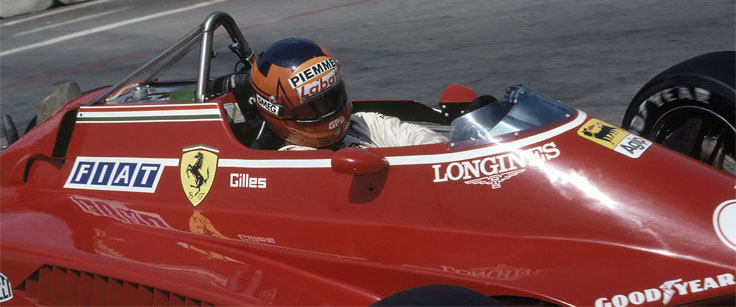
Gilles Villeneuve won only six of his 67 grands prix and has not a single world championship to his name. History, though, goes beyond numbers and will remember the diminutive French Canadian as one of the sport's greatest competitors.
Perhaps Villeneuve's finest moment was his performance in a sodden practice session for the US Grand Prix East at Watkins Glen in 1979. His Ferrari team-mate Jody Scheckter, the new world champion, was confident of being comfortably fastest, until he looked at the timesheets; Villeneuve was over 9.5 seconds quicker.
A horrific accident in qualifying for the 1982 Belgian Grand Prix ultimately claimed Villeneuve's life. Speaking at his funeral Scheckter said: "I will miss Gilles for two reasons. First, he was the fastest driver in the history of motor racing. Second, he was the most genuine man I have ever known."

| Born | 18 Jan 1950 |
| Died | 8 May 1982 |
| Active years | 1977 - 1982 |
| Best | 2nd (1979) |
| Presences | 68 |
| Starts | 67 |
| Wins | 6 |
| Podiums | 13 |
| Poles | 2 |
| Front row | 8 |
| Fastest laps | 8 |
| Races led | 18 |
09

SPAIN
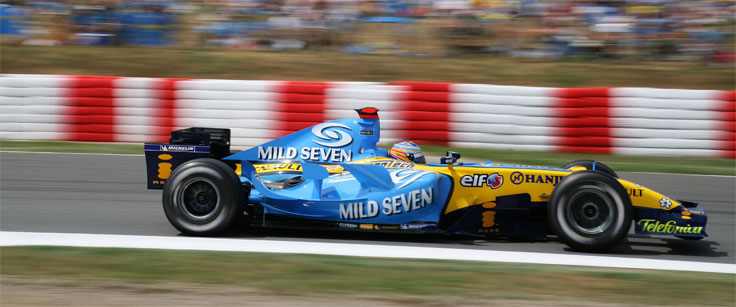
The Michael Schumacher juggernaut was unstoppable in the first part of the 2000s, but it was brought to a halt by Spain's first world champion in 2005.
After being groomed for greatness by Flavio Briatore, he took his maiden pole and victory in his first year as a Renault race driver in 2003. When the team hit the jackpot with its 2005 and 2006 cars, it was Alonso who seized the initiative to take two titles.
Despite the unquestionable determination and pure speed, Alonso is far from perfect - witness an explosive season on and off the track at McLaren in 2007.
But after returning to an ailing Renault team he had them back to winning ways by the end of 2008. His last season with the French squad was a write-off due to a dud car, but Ferrari beckons for 2010.

| Born | 29 Jul 1981 |
| Age | 28 |
| Active years | 2001 - 2009 |
| Champion | 2005, 2006 |
| Presences | 140 |
| Starts | 138 |
| Wins | 21 |
| Podiums | 53 |
| Poles | 18 |
| Front row | 30 |
| Fastest laps | 13 |
| Races led | 53 |
08

GREAT BRITAIN
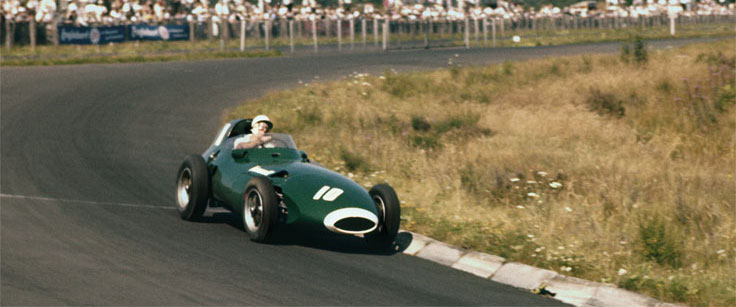
If this list was for the greatest all-round racing driver, there'd be a strong case for putting Stirling Moss right at the top. Success in sportscars, touring cars and rallying underlined the breadth of his talent.
And he was great enough in F1 to be high up here too. Having learned his craft alongside Juan Manuel Fangio at Mercedes-Benz in 1955, Moss increasingly became the great Argentinian's main rival. After Fangio retired, Moss took over the mantle of the best driver in the world until his Goodwood crash in 1962.
Among his 16 GP wins were some of the greatest F1 victories: beating Fangio by over three minutes at Pescara in 1957; winning the '58 Argentinian GP in a two-litre Cooper; defeating the otherwise dominant 1961 Ferraris at Monaco and the Nurburgring in a privateer Lotus.
Moss may never have won the world championship, but his peers used him as benchmark by which they judged their own performances. Enough said.

| Born | 17 Sep 1929 |
| Age | 80 |
| Active years | 1951 - 1961 |
| Best | 2nd (1955, 1956, 1957, 1958) |
| Presences | 67 |
| Starts | 66 |
| Wins | 16 |
| Podiums | 24 |
| Poles | 16 |
| Front row | 37 |
| Fastest laps | 19 |
| Races led | 31 |
07

AUSTRIA
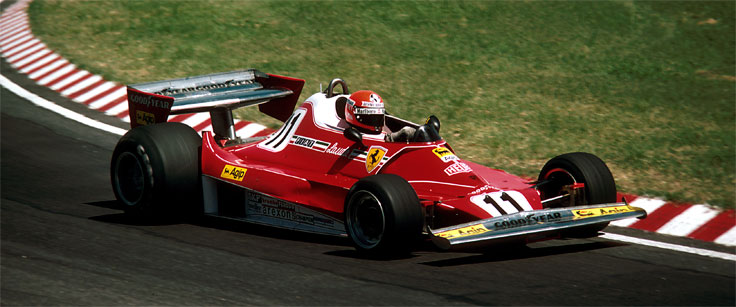
The Austrian was regarded as a no-mark when he bought his way into Formula 1 with March after an average career in F3 and F2, but some eye-catching performances with BRM in 1973 earned him a surprise move to Ferrari.
A Ferrari driver hadn't won the world championship since 1964 (sound familiar, Schumacher fans?) and the Austrian helped to galvanise the team into fulfilling its potential. After one season, he had displaced Clay Regazzoni as team leader and comfortably won the 1975 world championship.
He'd have won three-in-a-row but for his near-fatal accident at the Nurburgring in 1976, but despite winning the 1977 title left Ferrari for Brabham, partly because of what he felt was the team not backing him as lead driver when he returned from injury.
After retiring in 1979, his four-year return with McLaren resulted in the 1984 world championship and rounded out one of the most remarkable careers in F1.

| Born | 22 Feb 1949 |
| Age | 60 |
| Active years | 1971 - 1985 |
| Champion | 1975, 1977, 1984 |
| Presences | 177 |
| Starts | 171 |
| Wins | 25 |
| Podiums | 54 |
| Poles | 24 |
| Front row | 31 |
| Fastest laps | 24 |
| Races led | 41 |
06

GREAT BRITAIN
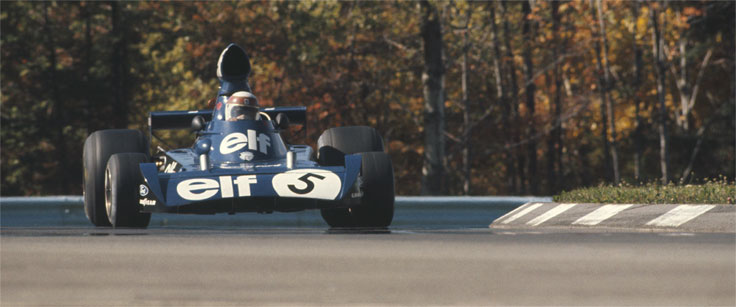
Jackie Stewart was one of those drivers who was so smooth, so precise, that he didn't look quick unless you had a stopwatch in your hand.
But Stewart wasn't only about speed. The 1969, 1971 and 1973 world champion is the man who set the template for his era. Always thinking, among his 27 wins are myriad examples of how he out-thought the opposition. His last lap win at Monza in 1969 is the stuff of legend and was the result of a decision to run a long fourth gear for the run to the line. But he was also an inspired virtuoso, as his incredible win in the wet at the 1968 German Grand Prix proved.
His relationship with Ken Tyrrell was the most important one in his career. He won the championship for him in Matra and then Tyrrell machinery, and even managed to drag a race win out of an only reasonable March chassis in 1970.
His crusade to improve safety standards only adds to the living legend that is Sir Jackie Stewart.

| Born | 11 Jun 1939 |
| Age | 70 |
| Active years | 1965 - 1973 |
| Champion | 1969, 1971, 1973 |
| Presences | 100 |
| Starts | 99 |
| Wins | 27 |
| Podiums | 43 |
| Poles | 17 |
| Front row | 42 |
| Fastest laps | 15 |
| Races led | 51 |
05

GREAT BRITAIN
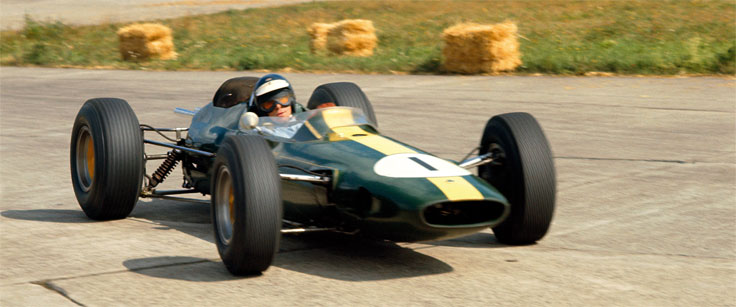
Perhaps the greatest natural talent ever seen in Formula 1. Clark didn't seem to understand why he was fast, but destroyed top fields time and again.
He formed a remarkable relationship with boss Colin Chapman, meaning he often had the fastest car. So equipped, Clark dominated and would have won more than two titles had it not been for poor reliability.
In less competitive machinery, Clark showed he could fight against the odds. His battle with a two-litre Lotus against the three-litre Brabhams at the 1966 Dutch GP went unrewarded, but he did take victory with the unfancied H16 BRM engine in the US GP that year.
The Lotus 49 and Clark made for an awesome combination and the 1968 title would surely have fallen to the Scot had he not been killed at Hockenheim in a Formula 2 race.

| Born | 4 Mar 1936 |
| Died | 7 Apr 1968 |
| Active years | 1960 - 1968 |
| Champion | 1963, 1965 |
| Presences | 73 |
| Starts | 72 |
| Wins | 25 |
| Podiums | 32 |
| Poles | 33 |
| Front row | 48 |
| Fastest laps | 28 |
| Races led | 43 |
04

FRANCE
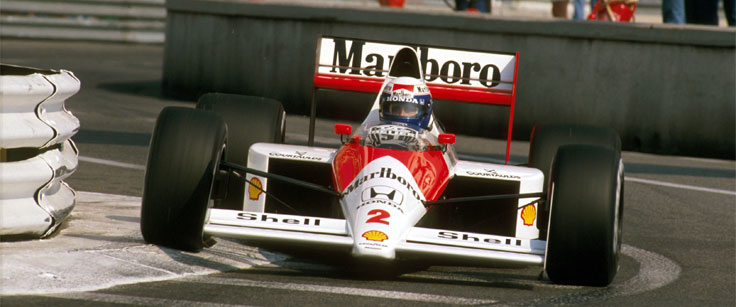
They called him 'le professeur'. Silky smooth, fiercley intelligent and with four world titles on his CV, it was a well-deserved nickname
Prost learned how to win races with unreliable Renault from 1981-1983, but it was losing to McLaren team-mate Niki Lauda in 1984 that taught him that you also needed guile to win a title. Back-to-back crowns followed.
But it was Prost's battles with Ayrton Senna, who joined McLaren in 1988, that defined his career. Their relationship hit rock bottom at Suzuka in 1989, where a collision between the two gave Prost to take his third world title. A year later, with Prost now at Ferrari, it happened again, this time with Senna clinching the crown.
After falling out with Ferrari, Prost took a year out before returning for one more year with Williams in 1993. Needless to say, he won the title.

| Born | 24 Feb 1955 |
| Age | 54 |
| Active years | 1980 - 1993 |
| Champion | 1985, 1986, 1989, 1993 |
| Presences | 202 |
| Starts | 199 |
| Wins | 51 |
| Podiums | 106 |
| Poles | 33 |
| Front row | 86 |
| Fastest laps | 41 |
| Races led | 84 |
03

ARGENTINA
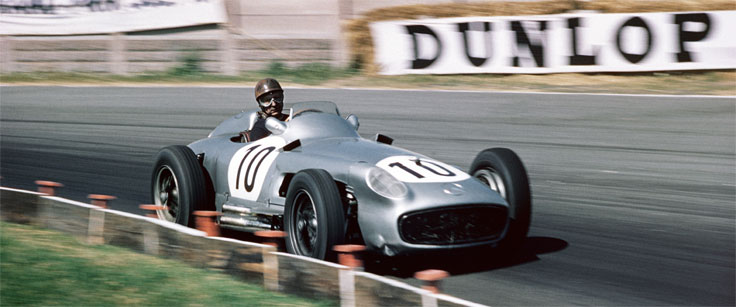
The first true great of the world championship F1 era, 'El Maestro' took five titles and won 47 per cent of the grands prix he started.
It's true that Fangio often got himself into the best cars - he drove for Alfa Romeo, Maserati, Mercedes-Benz and Ferrari - but he was a key part in making them look that good. He won titles with all.
Revered by his peers, Fangio often seemed to win without having to push himself to the limit, such was his advantage over the rest. The most famous exception - his comeback drive to win the 1957 German GP on the fearsome Nurburgring, in which he broke the lap record numerous times - is often cited as the greatest grand prix drive in history.
Fangio's record - at a time when racing was brutally dangerous - marks him as one of the all-time greats, remarkably all achieved when the Argentinean was in his 40s.

| Born | 24 Jun 1911 |
| Died | 17 Jul 1995 |
| Active years | 1950 - 1958 |
| Champion | 1951, 1954, 1955, 1956, 1957 |
| Starts | 51 |
| Wins | 24 |
| Podiums | 35 |
| Poles | 29 |
| Front row | 48 |
| Fastest laps | 23 |
| Races led | 38 |
02

GERMANY
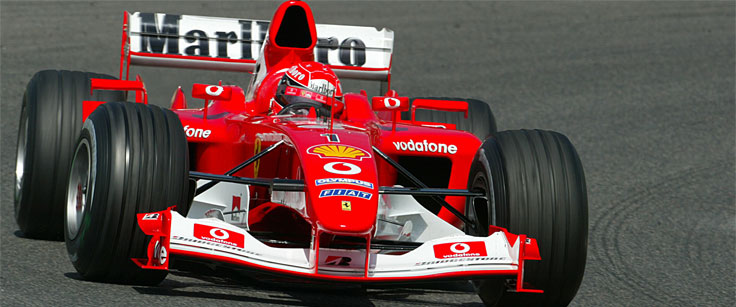
Statistically the most successful driver in F1 history, Michael Schumacher utterly dominated the sport in the early part of this decade.
Famed for his relentless pace and supreme ability to pump in quick times at crucial moments in races, Schumacher can make a case to be called the most complete F1 driver ever.
Sometimes controversial and always uncompromising, Schumacher, like most champions, had great desire, speed and racecraft. But his work ethic, supreme fitness and ability to galvanise teams around him were the qualities that really made him stand out.
After taking his first two world titles with Benetton in 1994 and '95, Schumacher took key personnel with him to Ferrari and hauled F1's most successful team out of a serious slump. With Schumacher on board, Maranello enjoyed unprecedented success. The German scored 72 grand prix wins and five consecutive drivers titles from 2000-2004.

| Born | 3 Jan 1969 |
| Age | 40 |
| Active years | 1991 - 2006 |
| Champion | 1994, 1995, 2000, 2001, 2002, 2003, 2004 |
| Presences | 250 |
| Starts | 248 |
| Wins | 91 |
| Podiums | 154 |
| Poles | 68 |
| Front row | 115 |
| Fastest laps | 76 |
| Races led | 141 |
01

BRAZIL
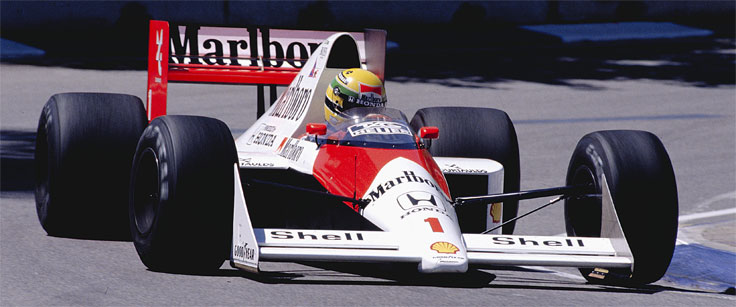
Arguably faster than any other driver of his era, as his 41 grand prix wins and three world titles proved, Senna also had a ruthless streak like no other.
Prior to his death at Imola in 1994, his incredible skill was showcased with some sensational wins, like his record six at Monaco and the famous displays of wet weather virtuosity at Estoril and Donington Park.
He will be remembered as much for his colliding with arch-rival Alain Prost - a man with whom he shared a mutual contempt after a McLaren team orders argument at Imola in '89 - at Suzuka title deciders in two successive years as for anything else.
He was a man who simply had so much self-belief that he could not fathom the idea of being beaten. It was the key to his greatness and his biggest flaw. Genius or thug? The debate will run and run. Not so the argument about his claim to be the greatest.

| Born | 21 Mar 1960 |
| Died | 1 May 1994 |
| Active years | 1984 - 1994 |
| Champion | 1988, 1990, 1991 |
| Presences | 162 |
| Starts | 161 |
| Wins | 41 |
| Podiums | 80 |
| Poles | 65 |
| Front row | 87 |
| Fastest laps | 19 |
| Races led | 86 |
不过,车神车王,实至名归,对于Alain叔滴排名,偶也很满意~~~
全部作者的其他最新日志
- • 八卦江湖
- • 雪邦,雪邦,战死沙场
- • Mr. Lion
- • 疯狂的咳嗽
- • 存一些凹凸滴新闻~~~











 悟空我英语真的很差。。。
悟空我英语真的很差。。。